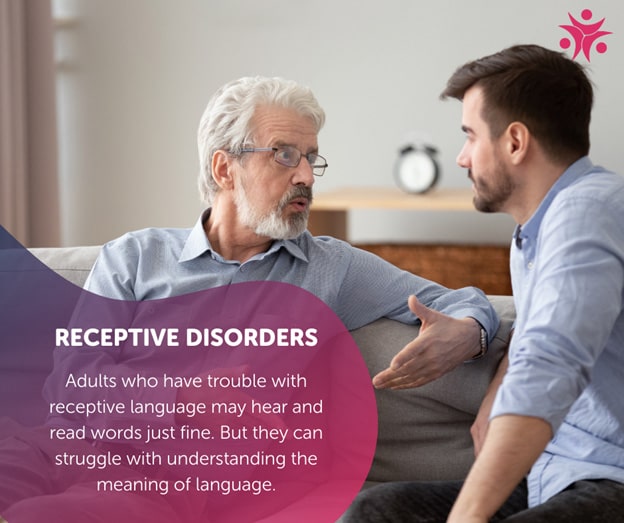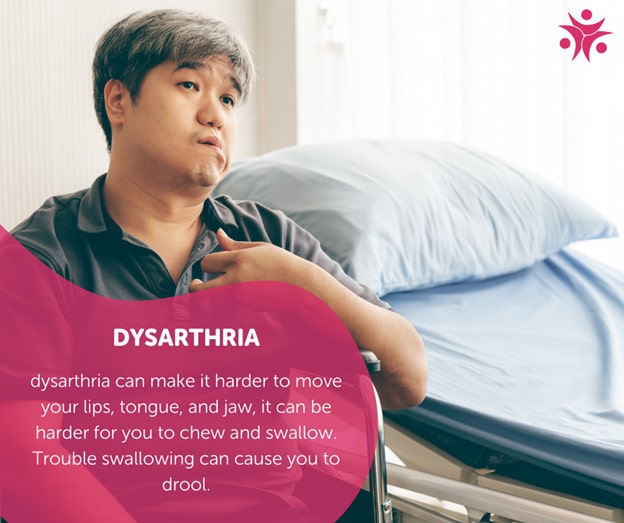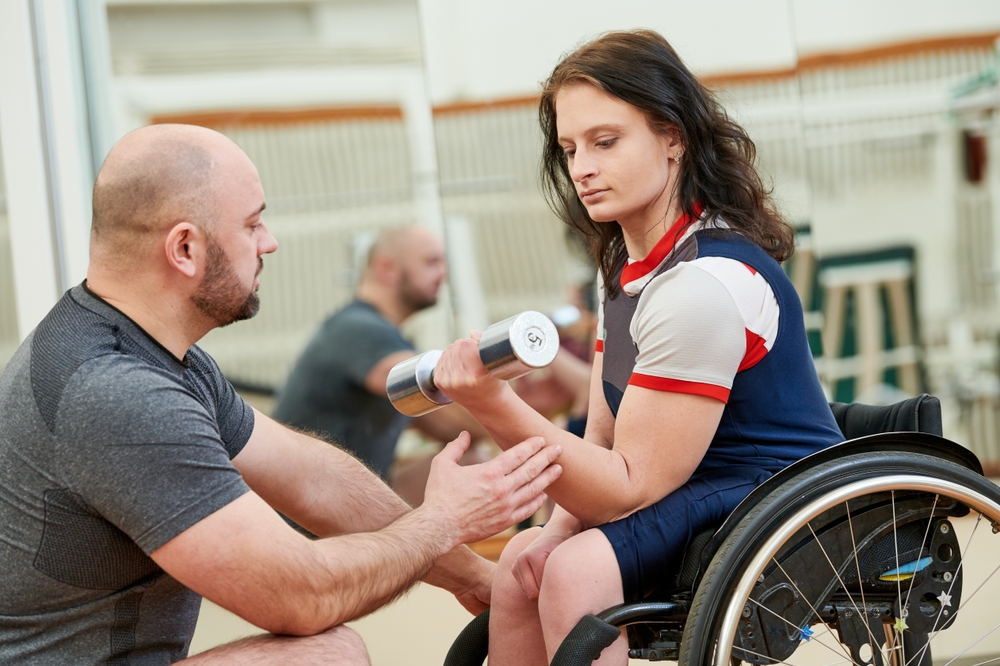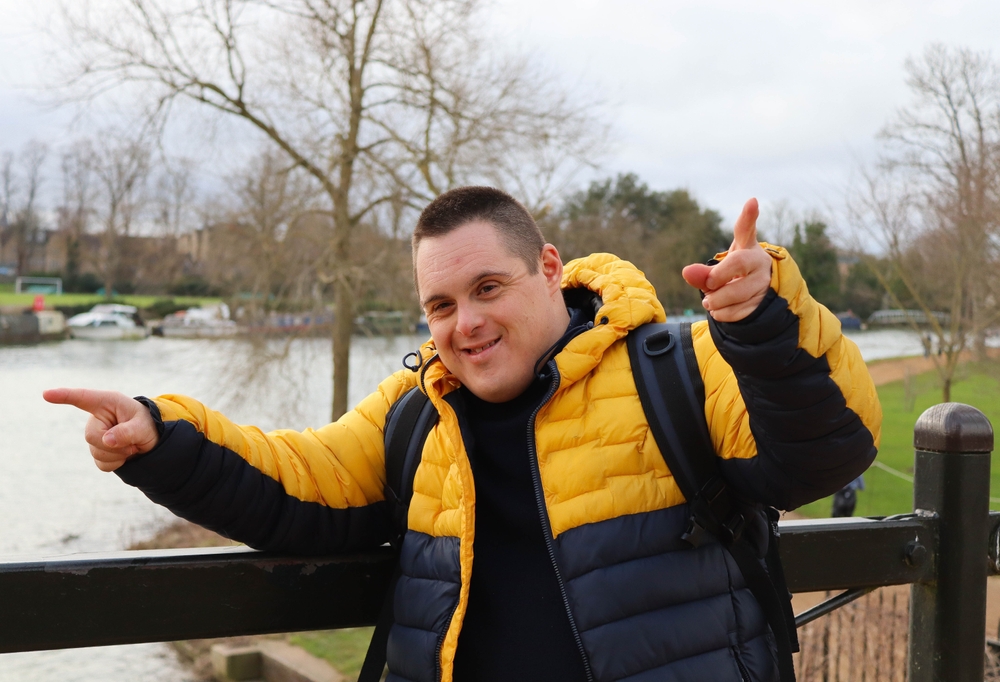Make an Appointment
If you or a loved one struggling with a stutter or recovering from a stroke and noticing issues with your speech, it could be time to seek the help of an adult speech therapist.
Here, we’re going over common speech problems faced by adults, what causes them, and how you can get started with a speech pathologist near you.
What Are The Common Speech Problems in Adults?
It’s true that many speech problems are related to adolescence. However, adults can suffer from speech impairments as well, requiring assistance from a professional speech therapist.
Below, we’re going over some of the more common speech issues you loved one might come across.
Articulation Disorders
Articulation disorders represent the inability to form certain words or sounds. A person with an articulation disorder might drop, swap, distort, or add words or sounds. A lisp is an example of an articulation disorder.
Fluency Disorders
Fluency disorders affect the speed, flow, and rhythm of speech. Examples of fluency disorders include stutters or cluttering.
People with a stutter may either have trouble making sounds, their speech is blocked or otherwise interrupted, or they’ll repeat part or all of a word.
Cluttering is a disorder where a person speaks incredibly fast while merging their words together.
Resonance Disorders
Resonance disorders occur when a blockage obstructs airflow in the nasal or oral cavities. They can also occur if the velopharyngeal gland won’t properly close. Both of these disorders can alter the vibrations responsible for voice quality.
Resonance disorders are a speech issue most often associated with cleft palate, neurological disorders, and swollen tonsils.
Receptive Disorders
Receptive disorders occur when a person has trouble receiving and processing the speech of others. Symptoms of receptive disorders include coming across as uninterested and rude, having trouble following directions, or a limited vocabulary.
Receptive disorders are often associated with autism, hearing loss, other language disorders, or head injury.

Expressive Disorders
Expressive disorders are when language becomes difficult to convey or express. With an expressive disorder, people have trouble forming correct sentences like, for example, using the correct grammar.
Expressive disorders are often associated with Down syndrome and hearing loss but can also be caused by a traumatic head injury or another medical condition.
Cognitive-Communication Disorders
Cognitive-communication disorders are caused by an injury to the part of the brain that controls your ability to think. Cognitive-communication disorders cause issues with memory, problem-solving, and difficulty speaking or hearing.
Cognitive-communication disorders might be caused by a biological defect such as abnormal brain development, some neurological conditions, brain injury, or stroke.
Aphasia
Aphasia is an acquired speech disorder most often caused by a stroke. It’s a communication issue that affects someone’s ability to speak, understand the speech of others, and, sometimes, affects whether they can read and write.
Again, stroke is the most common cause but can be brought about by other brain disorders as well.
Dysarthria
Dysarthria is characterised by slow or slurred speech. It is caused by a weakness or loss of control of the muscles required for proper speech. Nervous system disorders that cause facial paralysis or throat and tongue weakness are usually the cause.
Dysarthria is most commonly associated with stroke, multiple sclerosis (MS), and amyotrophic lateral sclerosis (ALS).
What can cause speech problems in adults?
Before we go into how speech therapy works in the case of adults, let’s first go into what causes slurred speech in adults and other speech problems beyond childhood.
In some cases, the issues are purely mechanical such as the case with certain resonance disorders and cognitive-communication disorders. This means physical issues with the nasal cavity or perhaps some sort of facial paralysis could be causing a speech impediment.
In others, mental health plays a role. For example, some adults experience a stutter only when they’re nervous or anxious in social situations making it difficult to express themselves.
Furthermore, brain injury is another common cause of certain speech issues requiring an adult speech pathologist. Plus, many adults who’ve experienced a stroke often require speech therapy since strokes cause many of the aforementioned speech disorders.
So, while many speech issues are picked up in childhood, there are still many reasons why an adult might need speech therapy.
How Speech Therapy Works?
When you go to see a speech therapist as an adult, your first appointment will begin with an assessment to determine your needs. Then, you’ll work together to come up with a plan for your treatment.
Depending on your goals, your adult speech therapist will work with you through a variety of vocal exercises. These speech therapy exercises might include:
- Problem-solving, memory, and organisational activities with the aim of improving cognitive-communication
- Conversational strategies to improve social interactions
- Breathing exercises for resonance disorders
- Exercises that strengthen the oral muscles
Your speech pathologist may also recommend speech therapy apps, language development games, workbooks, and exercises to practise at home.

How Can a Speech Therapist Help?
If you have a serious and unmanageable speech impediment, there’s a lot a speech therapist can help you with as an adult.
A adult speech therapist can help adults with all of the common speech disorders we mentioned earlier. However, even without some of the more serious speech issues some adults may face, a speech pathologist can also assist with less severe speech-related concerns.
Speech therapy for adults can also help with:
- Projecting voice more efficiently
- Language and non-verbal communication strategies to improve small-talk
- Reducing mumbling
- Curbing unhelpful habitual speech patterns like low, grumbling or high-pitched “Valley girl” tones
- Social anxiety
- Interview preparation and professional communication skills
- Transgender communication training
- Public speaking strategies
- Accent modification
- Adult stutter
What neurological disorders cause speech problems?
Neurological disorders that can cause speech problems include:
- Amyotrophic lateral sclerosis (also known as ALD or Lou Gherig’s disease)
- Cerebral palsy
- Brain injury or brain tumor
- Guillain-Barre syndrome
- Huntington’s disease
- Multiple sclerosis
- Parkinson’s disease
Neurological disorders are those affecting the central and peripheral nervous system including the brain, spinal cord, nerves and muscles.
However, speech problems can also be caused by non-neurological conditions such as a head injury, Lyme disease, Myasthenia dystrophy, Wilson’s disease and stroke.
Still, even though these conditions are not considered neurological in onset, they still somehow affect the nervous system. Hence, most speech problems stem from neurological interference of some kind.
What can cause sudden speech problems?
Sudden speech problems can be caused by stress and exhaustion, excess alcohol consumption, stroke, migraines, neurological disorders or certain medications.
When you suddenly lose the ability to communicate through speech, it can certainly be a troubling experience. However, one of the above reasons could be the culprit.
Stress and exhaustion can make it difficult to put your thoughts into words. Additionally, when you’re stressed about what to say or anxious about speaking to others or large groups, getting tongue-tied is a common experience.
Getting enough sleep will help you think and communicate clearly and working with a dedicated adult speech pathologist can help you work through your social anxiety to alleviate some of these speech problems you might be facing.
Excess alcohol consumption slows down the communication between your brain and your body. Alcohol is a depressant and drinking too much of it can lead to a slew of issues including slurred speech. It’s important to seek help if you’re worried about your levels of alcohol consumption.
A stroke occurs when oxygen is cut off to the brain. It causes impaired speech, numbness on one side and drooping of one side of the face. A stroke is incredibly serious requiring immediate care. Call 000 at the first signs of stroke to get immediate help and to avoid permanent speech problems called aphasia.
Migraines can also cause speech problems as well as causing issues to all of your senses. These speech problems go away after the migraine subsides but if you experience frequent migraines, see a doctor in case of a deeper neurological disorder.
Neurological disorders affect your brain, spinal cord and nerves which affects your brain’s ability to connect with your body. Various neurological disorders can cause speech problems due to this disconnection.
Certain medications can cause speech problems due to allergies, sedative ingredients or side effects such as drying out your vocal cords. If you’ve recently started a new medication and are experience speech problems, speak to your doctor immediately.
How do I fix slurred speech?
Working with a speech pathologist is the best way to fix slurred speech. Especially if your speech problems are caused by a neurological disorder, anxiety or stroke, a speech pathologist can assist in re-building those neurological connections and improve any mechanical speech issues you may be facing.
Additionally, discontinuing whatever may be causing your speech problems is another way to fix slurred speech. For example, getting enough rest, avoiding alcohol and discontinuing any medications that cause slurred speech should also help fix slurred speech.
Book an appointment with one of our incredible team of adult speech pathologists across Australia. At Physio Inq, our adult speech pathology therapists are here to help you with all your speaking needs from stutters to social anxiety.
Take advantage of our dedicated team of adult Speech Pathology mobile services that come to you, or complete your speech therapy sessions remotely with our telehealth offerings.
Why worry about the stresses of parking and traffic when you simply don't have to anymore with our home visits?
Don’t let your speech problems hold you or a loved one back Make an online appointment or referral today. Alternatively get in touch with our intake team on 1300 731 733.
Date Published: Wednesday, June 23, 2021
Locate a Adult Speech Pathology
Service Near me
Get the experience & convinence you deserve to support your or a loved one's allied health needs.
Our Adult Speech Pathology team are currently serving & taking appointments in the following states and regions in Australia:
Need to get into direct contact with ur Client Services team? We're all ears. Call our team directly on 1300 731 733












